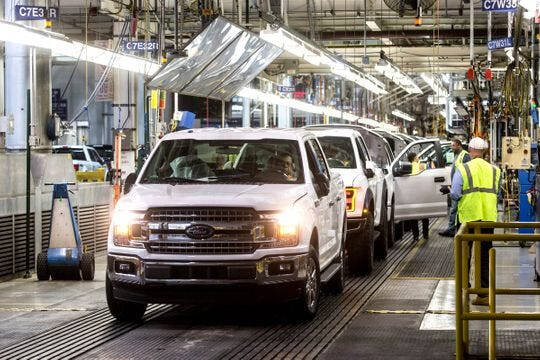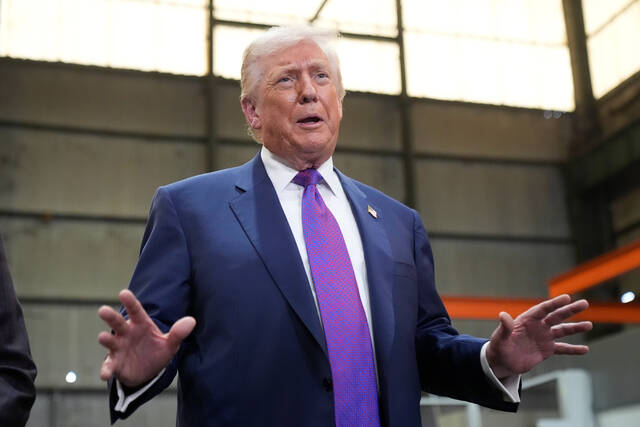The Detroit automakers are staring at a looming semiconductor chip crisis that could put the brakes on much of their new car production.
A group representing major carmakers has warned that a dispute between China and the Dutch government has brought on a disruption in the delivery of semiconductor chips, which are used in a variety of car parts.
According to Reuters, automakers and their suppliers received notice from Nexperia last week that it could no longer guarantee delivery of its chips, said ACEA, the European Union’s auto association.
The group warned that auto manufacturing could be significantly disrupted as a result. Reuters said people at some of the automakers told Reuters that U.S. car production could be affected as early as next month. The people requested to not be named due to the sensitivity of the issue.
The warning comes after the Dutch government said Sunday that, as of Sept. 30, it had taken control of Chinese-owned computer chipmaker Nexperia over concerns of a possible transfer of technology to Nexperia’s Chinese parent company, Wingtech. Reuters said most of Nexperia’s chips are made in Europe but they are then packaged in China. Neither side of the company’s operations would be able to quickly find alternative partners. It is not clear how long customers’ stockpiles can last.
Auto group urges a quick resolution
Reuters cited court documents as showing the Dutch government’s move came after months of mounting U.S. pressure on Nexperia. The chipmaker was at risk of being impacted by a new U.S. rule that extends export control restrictions to companies at least 50% owned by one or more entities on the U.S. entity list. Washington put Wingtech, which owns 100% of Nexperia, on the U.S. entity list in December.
The development has thrown the auto industry on high alert with General Motors and Stellantis saying they are closely monitoring the situation. Ford Motor declined to comment.
But the Alliance for Automotive Innovation, which represents GM, Toyota, Ford, Volkswagen, Hyundai and other major automakers, begged for a quick resolution citing the potential for significant economic disruption.
“We don’t know all the circumstances surrounding this incident. What we do know (from very recent experience) is this: Disruptions to the interconnected automotive supply chain will quickly ripple inside the U.S. and around the world,” John Bozzella, CEO of Alliance for Automotive Innovation, said in a statement to the Detroit Free Press. “If the shipment of automotive chips doesn’t resume ― quickly ― it’s going to disrupt auto production in the U.S. and many other countries and have a spillover effect in other industries. It’s that significant. We’re urging a quick resolution, so U.S. and global automaking remains on track.”
GM is working around the clock
As of now, GM’s production has not been impacted by the burgeoning chip shortage, but CEO Mary Barra told investors early Tuesday during GM’s third-quarter earnings call that GM is scrambling to ensure it can source chips elsewhere and mitigate any production disruptions.
“This is an industry issue. While this has the potential to impact production, we have teams working around the clock with our supply chain partners to minimize possible disruptions. The situation is very fluid,” Barra said.
She said GM’s team “jumped into action” to evaluate where there could be potential disruptions and what different sources it could use for chips.
“The team is working around the clock to get that done,” Barra said. “We’re very hopeful this is going to get resolved. In the meantime, the team continues to work as we speak to make sure we continue to identify other sources, so we keep running.”
Stellantis spokesperson Kaileen Connelly told the Detroit Free Press in an email: “Stellantis is closely monitoring the situation and collaborating with Nexperia and other suppliers to assess potential impacts and develop mitigation measures.”
Ford spokesman Mike Levine told the Detroit Free Press: “We don’t comment on supplier issues.”
But this news comes just as Ford is facing its own pending problem of a shortage of aluminum due to a fire at its supplier, Novelis, in New York. Ford uses aluminum in the bodies of many of its vehicles, including its top seller, the F-Series pickup. As the Free Press has reported, sources said Ford has paused production of the all-electric Ford F-150 Lightning and two of its large SUVs due to the aluminum shortage.
Ford declined to comment on any adjustments to its vehicle production and said it will provide more details as to how the aluminum shortage will impact its fourth-quarter results on Oct. 23 when Ford reports its third-quarter earnings.
As to the chip situation, Levine directed the Free Press to MEMA, an association that represents vehicle suppliers.
Auto supplier group calls on Trump
MEMA spokeswoman Megan Gardner sent a statement that said the group is closely monitoring the “recent export restrictions impacting semiconductors and diodes, including the developments related to Nexperia. Suppliers across the motor vehicle industry are working to understand the potential effects on production and supply continuity.”
MEMA said chips and diodes are foundational to automotive components and systems. They are used in infotainment systems, door handles, steering and braking. The absence of a single diode or chip can disrupt the manufacture of vehicles.
MEMA’s statement said automotive suppliers source thousands of components globally and have made significant progress in diversifying their supply chains since the 2021 semiconductor shortage.
“However, risk still exists,” the statement said. “This issue reaches far beyond Tier 1 suppliers; it affects sub-tier suppliers throughout the global supply base that provide the building blocks for nearly every vehicle system.”
MEMA said it is coordinating with suppliers, automakers, consumer electronics partners, and other trade associations to assess the full scope of impact, indicating it will turn to President Donald Trump for assistance if needed.
“Together, we aim to ensure the administration understands the potential consequences for U.S. manufacturing and supply chain competitiveness and to support constructive solutions that protect both national and economic security,” MEMA’s statement read.
The last chip crisis
The tiny chips, about the size of a quarter, indeed can cause big problems.
Four years ago, a shortage of semiconductor chips nearly brought U.S. vehicle production to a halt. Car dealers had barren parking lots, consumers faced limited options on new car purchases and many buyers had to wait months for their new ride to be built.
The chips are tiny transistors made from silicon, which is found in most of the minerals on the Earth’s surface. They allow computers, smart phones, appliances and other electrical devices to function. Most vehicles can’t run without them.
The 2021 chip shortage was the result of the covid-19 pandemic, which increased demand for the personal electronics such as cell phones and laptops that the chips are used in to the point where production could not keep pace with demand.
—-
Detroit Free Press staff writers Jackie Charniga and Liam Rappleye contributed to this report.








